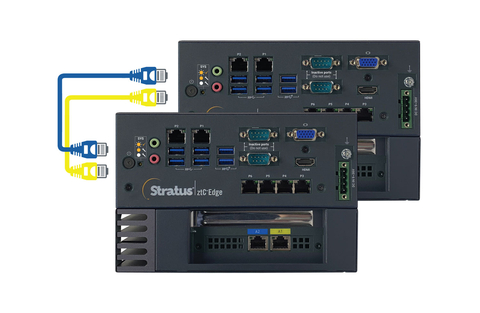Latest Release of Stratus’ Linux-Based Fault Tolerance and Virtualization Software Increases Edge Infrastructure Capabilities
Stratus Redundant Linux 3.0 and Stratus everRun 8.0 deepen support for open platforms, simplify edge infrastructure management, and deliver up to

Stratus Redundant Linux 3.0, the operating system for the Stratus ztC Edge platform, delivers virtualization and continuous availability with its built-in hypervisor and fault tolerance. (Photo: Business Wire)
“The latest release by Stratus of its continuous availability software with built-in virtualization is key for us to continue running a Linux environment while also gaining higher performance and security, enabling multiple virtual machine modes and allowing users to have more capabilities in different scenarios,” said Mr. Wei Zhang, Industrial Computing Product Manager, Shanghai Hi-Tech Control System Co., Ltd. “Additionally, the open RESTful API interface can be integrated with more IT and OT systems to facilitate monitoring and maintenance by OT field personnel. Stratus’ everRun software will be used in more industries to help customers improve business continuity and save more costs.”
Stratus continues its commitment to Linux development using the Ubuntu distribution to deliver its unique combination of built-in fault tolerance and virtualization in an open environment. SRL 3.0 and everRun 8.0 simplify edge manageability, improve security, and increase performance up to
“Organizations face the dual challenge of rapidly modernizing their edge infrastructure and ensuring maximum reliability of their underlying compute infrastructure to innovate with software and harness edge data for insight,” said Craig Resnick, vice president of consulting, ARC Advisory Group. “Being able to do so in open environments that simplify management and reduce IT dependencies is paramount to creating more agile and resilient business.”
Simplified Edge Manageability and Up to
Stratus Redundant Linux is ztC Edge’s operating system (OS) that delivers both built-in virtualization and out-of-the-box high availability and fault tolerance. Using ztC Edge, organizations are able to deploy edge computing infrastructure to run mission-critical applications without downtime or data loss outside the enterprise such as branch locations or rugged industrial sites where IT staff are limited.
Stratus ztC Edge is purpose-built for OT and IT teams to rapidly modernize and scale edge infrastructure for more efficient, flexible, and future-proofed operations. SRL 3.0 is backwards compatible with the ztC Edge 100i, 110i, 200i, and 250i platforms.
New features and enhancements that SRL 3.0 brings to the ztC Edge platform include:
- New APIs for expanded edge manageability – SRL 3.0 adds more than two dozen RESTful API calls for remote management and visibility into platform health from local control rooms, the cloud, or single-pane-of-glass operations centers. These APIs simplify management of Stratus ztC Edge platforms and enable end users to manage those platforms alongside other devices using their preferred IT tools.
-
Up to
30% increase in performance – The latest version of SRL delivers more processing efficiency, resulting in a significant boost in performance over ztC Edge platforms running previous versions of SRL. - Support for more Linux guest operating systems – SRL 3.0 expands the list of guest OSs it supports, including the most recent Linux variants such as CentOS Stream, Oracle Enterprise Linux, Red Hat Enterprise Linux, and Ubuntu Server. For the full list of Windows and Linux guest OSs that SRL 3.0 supports, visit the Stratus ztC Edge guest operating system support page.
- Non-redundant virtual machines for cybersecurity use cases – End users have the option to designate select virtual machines (VMs) as non-redundant in a paired/dual deployment ztC Edge configuration. This capability enables IT teams to prevent the spread of malware by setting up a single, non-redundant VM for threat scanning and one-way traffic monitoring.
- Shift to Ubuntu Linux-based development – With SRL 3.0, Stratus has moved from its prior CentOS-based Linux development to Ubuntu Linux, which is the largest and most popular version of Linux. This change ensures a long-term roadmap for Linux development as well as regular support for common vulnerabilities and exposures (CVEs) and other patches.
Expanded Fault-Tolerant Performance for New and Existing x86 Infrastructure with everRun 8.0
Stratus’ everRun software brings fault tolerance to heterogeneous IT infrastructure in an open, standards-based Linux environment, ensuring applications continue to run without interruption or data loss. It also enables organizations to bring the features and functionality of SRL 3.0 and its Linux-based fault tolerance and virtualization to new and existing Intel x86 server infrastructure. In addition, everRun 8.0 adds support for Intel’s fourth-generation Xeon® Scalable line of server processors.
As a perpetual license, everRun 8.0 is available for download and upgrade at no charge for customers on Stratus Support contracts.
Stratus, ztC Edge, and everRun are trademarks owned by Stratus Technologies Ireland Ltd., a wholly owned subsidiary of SMART Global Holdings, Inc. All other logos, trade names, and trademarks are the property of their respective owners. No claim is made thereto.
About Stratus
For leaders digitally transforming their operations to drive predictable, peak performance with minimal risk, Stratus ensures the continuous availability of business-critical applications by delivering zero-touch Edge Computing platforms that are simple to deploy and maintain, protected from interruptions and threats, and autonomous. For 40 years, we have provided reliable and redundant zero-touch computing, enabling global Fortune 500 companies and small-to-medium sized businesses to securely and remotely turn data into actionable intelligence at the Edge, cloud and data center – driving uptime and efficiency. For more information, please visit www.stratus.com or follow on X @StratusAlwaysOn and LinkedIn @StratusTechnologies.
View source version on businesswire.com: https://www.businesswire.com/news/home/20240521572175/en/
PR Contact
Maureen O’Leary, Director Communications
SGH / Stratus
pr@sghcorp.com
Source: Stratus Technologies Inc.







